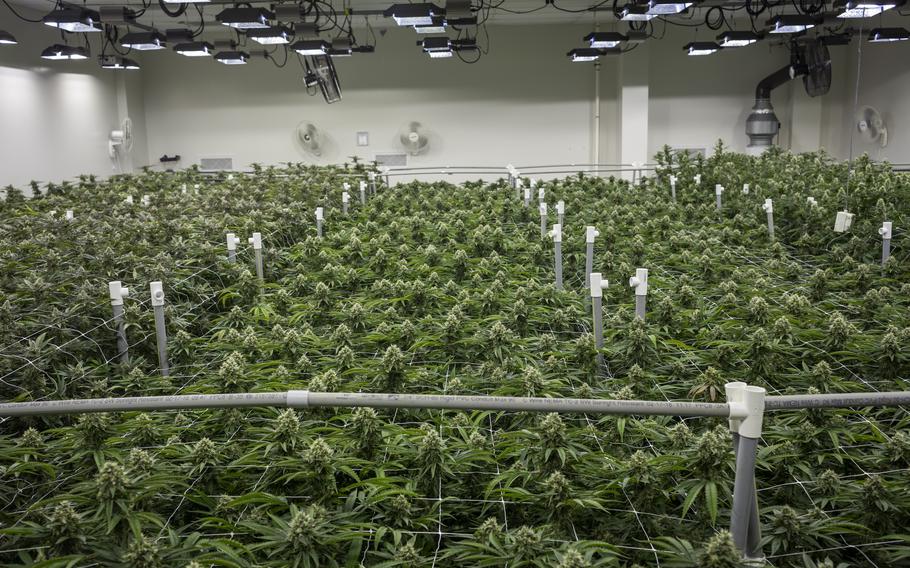
More than 300 veterans suffering from post-traumatic stress disorder will take part in a study to measure the effectiveness of smoking cannabis on symptoms from the illness. (Eric Kayne/Stars and Stripes)
WASHINGTON — The Food and Drug Administration has authorized a not-for-profit company in California to proceed with clinical trials to study the effectiveness of smoking cannabis to treat post-traumatic stress disorder in veterans.
MAPS — the Multidisciplinary Association for Psychedelic Studies — will initiate the short-term study of veterans who will smoke marijuana and report their reactions to the drug by using a mobile app, according to a letter from the FDA approving the clinical trials.
The five-week study will follow 320 participants diagnosed with moderate to severe PTSD who will smoke cannabis at home and then rate their PTSD symptoms by using an app that they download on their cell phone or another mobile device, according to MAPS.
PTSD is a mental health condition that causes anxiety, anger and flashbacks in individuals who have experienced terrifying events. People with PTSD might experience nightmares, depression and negative thoughts.
“This study is extremely important to me as a veteran because other medications I use do not work on my symptoms,” said Hether Zeckser, a 36-year-old former corporal who served in the Marines from 2007-2011.
Zeckser of Virginia, an advocate for cannabis research, said her own personal use of marijuana helps relieve her symptoms from service-connected PTSD, while the drugs that she is prescribed by her doctors at the Department of Veterans Affairs have not worked.
“I look forward to the outcome of this research,” she said. “I would like to see cannabis approved as a PTSD treatment and get health care coverage for the costs.”
The FDA has the authority to regulate and approve new drugs. Clinical trials with human test subjects are a step in that process.
For this study, veterans will receive active cannabis or a placebo. The study is double-blind, meaning the veterans and their clinicians will not know which dose they are receiving, said Allison Coker, director of cannabis research at MAPS.
A veteran’s PTSD symptoms will be assessed at the start and end of the treatment. Former service members selected for the clinical trials must have prior experience smoking cannabis. They also must agree to limit their cannabis use to the doses provided for the study, according to MAPS.
The FDA’s Division of Psychiatry Products cleared the Phase 2 study of smoked cannabis in veterans for the treatment of PTSD — called MJP2 — to proceed. Under FDA oversight, MAPS conducted an earlier phase of the study.
“This breakthrough decision opens the door to future cannabis research, mirroring real-world consumption and generating safety data to guide medical professionals,” Coker said.
MAPS is still in discussions with the FDA about when the trials will start.
“FDA clearance to initiate a study is only one of many start-up steps needed for the study to commence,” Coker said.
“FDA recognizes the potential therapeutic opportunities that cannabis or cannabis-derived compounds could offer and acknowledges the significant interest in these possibilities,” the FDA states on its website. “FDA continues to believe that the drug approval process represents the best way to help ensure that safe and effective new medicines, including any drugs derived from cannabis, are available to patients in need of appropriate medical therapy.”
Study participants initially will be trained to inhale cannabis while under observation. They will be supplied cannabis or placebos to take home and use on an outpatient basis.
Sites in Michigan, Arizona and Florida are under consideration for the trials, including VA facilities. Veterans will not undergo mental health counseling as part of the study.
“This is not a therapy study, and participants will not receive psychotherapy,” Coker said.
But the clinical trials will enable researchers to develop data about the safe use of cannabis to inform further studies of the drug, she said.
Patients with PTSD commonly use marijuana to manage their symptoms, but there is a lack of scientific evidence on its safety and effectiveness that reflect “real-world consumption patterns,” Coker said. “MAPS’ successful negotiations with the FDA will benefit future clinical researchers investigating cannabis as a potential medical treatment for serious health conditions.”
The study will be funded by the Michigan Veteran Marijuana Research Grant Program. MAPS is the trial sponsor.